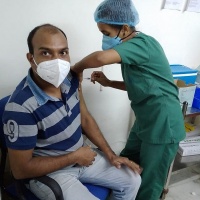JKPS has an extensive ministry, serving the slum communities and the most vulnerable people living in, and around, Kolkata. Reaching over 8,000 individuals a year, they aim to break the cycle of poverty through sustainable community development, education, advocacy, and physical support for those most in need, done through the lens of Jesus' love for all.
Our ministry partner, Jatiyo Kristyo Prochar Samity (JKPS), is working across the city of Kolkata and the whole of the West Bengal region to serve the neediest communities.
JKPS runs an extensive ChildAid ministry, helping to support the poorest and most vulnerable children in their society, and their families, so that they have a greater chance of breaking free from the cycle of poverty. In addition to the ChildAid scheme, JKPS also run a number of Education Centre’s, giving more general educational support to the children of the poorest communities. They run mobile medical units, micro-finance scheme’s, community development programmes, and anti-trafficking work.
Hidden behind the thriving industrialised region of Kolkata are rural communities, living in extreme poverty. Here, people often live in mud huts, vulnerable to monsoon rains and severe flooding, and many live without sanitation, healthcare, or education. JKPS are the only NGO operating in some of these regions, and their work is vital.



Programmes include:
Anti-trafficking work (Mahima Homes)
An extensive network of homes and support centres are run through JKPS’s sister organisation, Mahima Homes. Here, they are supporting and serving those that society ignore or turn away from, the victims of human trafficking and enforced prostitution.
Ashaloy House is a drop-in centre right in the heart of Kolkata’s red-light district, providing support and resources to the women who work there, and their children. Here, they have access to healthcare, legal advice, counselling, and the support system that is run by Mahima.
Various residential homes give women and young girls who have been rescued from the traffickers, somewhere safe to live. Here, the victims can receive physical, emotional, and spiritual healing. Mahima provide food, medical care, counselling, education, and vocational training.
Other residential homes, such as the Premanand Boys home, have been set up to give a safe home to the children of women still working in the red-light district. Here, the children are cared for, fed, receive schooling and medical care, helping to break the cycle of abuse.
Education Centres
JKPS run education schemes in various slum communities, providing education support to up to 60 students at each. School provision in these communities is very poor, and many children do not make progress, and end up leaving education at a young age. These Education Centres provide additional tutoring and support for poor and vulnerable children, funded through regular support from various sources, including generous WorldShare supporters.

Medical Camps
The mobile medical units mean that local and international medical teams and volunteers can set up medical camps where most needed, in the slum villages and communities around Kolkata in order to provide health and dental care to the communities. The most prominent concerns are usually malnutrition, fevers, and parasites, with the teams also responding to injuries as needed.

Micro-finance loans and vocational training schemes
JKPS run several micro-finance schemes where women are given access to training and the opportunity to start or develop small business in order to help provide for themselves and their families. The various schemes aim to help individuals to become self-sustaining and are having a huge positive impact on the families involved.

About India
India is a country diverse in language, caste, religion, and culture with a staggering 4,635 distinct people groups. Hinduism claims about 80 percent of the Indian population, with Islam at 13 percent and Christianity at just 2 percent. Though India is a secular and democratic country, the call for a return to Hinduism is growing in strength. Several states have enacted strong anti-conversion laws which hamper evangelism and ministry efforts.


